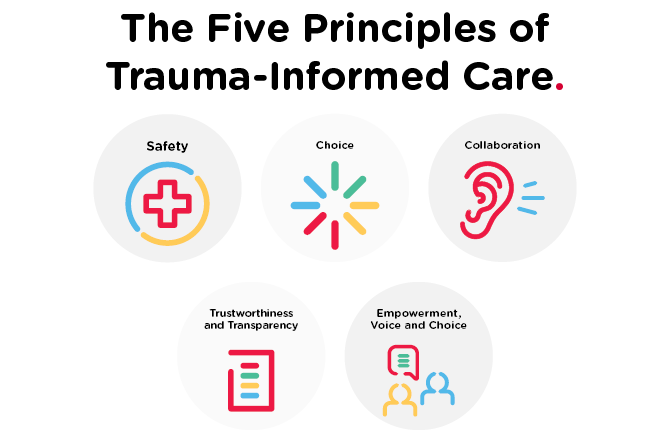July 29, 2021
The link between trauma, alcohol and other drugs

Most of us will experience some form of trauma during our lives.
In fact, 68% of young Australians will experience a traumatic event by the time they’re 161, and 75% of adults will experience a traumatic event in their lifetime.2
Trauma is an emotional response to something that happened to you directly, to someone you care about, or something you witnessed.3
Not everyone responds to trauma in the same way.
Most people will recover with the help and support of friends and family; however, for some people a traumatic event can lead to ongoing physical and mental health issues such as depression, anxiety and post-traumatic stress disorder (PTSD).4
Traumatic experiences – especially those occurring during childhood – are also linked to substance use and dependence.5
Often substance use resulting from trauma co-occurs with PTSD.5 In fact, up to 59% of adolescents with PTSD develop substance use issues.6
Consequently, understanding the impact trauma can have physically, mentally and emotionally is critical for anyone working to support people experiencing substance use dependence in a trauma-informed way.
Different types of trauma
Trauma can result from a single event, such as a car accident; repeated exposure to a highly stressful occurrence, such as bullying; or multiple traumatic events involving personal relationships, such as family violence.7
Experiencing a traumatic event or repeated trauma activates the body’s stress response system.
This can make us more reactive to stress and leads to increased production of the body’s stress hormone, Cortisol.
When the body remains in a heightened sense of stress or arousal over a long period of time it produces too much Cortisol which becomes toxic.8
If not properly treated this toxic stress can lead to behavioural issues and conditions such as heart disease, diabetes, cancer, autoimmune syndromes and mental illness.8,9
Intergenerational trauma
Historical and intergenerational trauma impacts many Aboriginal and Torres Strait Islander people and communities.
The historical trauma caused by colonisation, the loss of culture and land and forced removal of children has been passed down through generations. The impact and result of this trauma continues with many descendants today experiencing persistent physical and mental health issues, substance use, family violence and incarcerations.10,11
The earlier the trauma, the greater the risk
Childhood trauma can have a profound effect on a child’s physical and mental health that can carry on into adulthood. Children who experience a traumatic event before the age of eight are particularly vulnerable.12
Toxic stress can cause changes to the developing brain.4 Research into Adverse Childhood Experiences (ACEs) has shown a direct link between the number of traumatic events a child experiences before age 18 and future behavioural, mental and physical health complications.13
But not all children who experience trauma will develop mental illness.
Psychological effects of trauma
While everyone reacts differently to trauma, common initial reactions may include feelings of sadness, anxiety, exhaustion, restlessness, agitation and numbness.14
Delayed and continued reactions may include:
- mood swings
- shame
- irritability and/or hostility
- fear of reoccurring trauma
- self-blame
- hyperarousal
- emotional detachment
- sleep disturbance
- intrusive memories or flashbacks
- high-risk behaviours
- increased use of alcohol and other drugs
- hopelessness and loss of purpose
- suicidal thinking.
What is a trauma-informed approach to AOD care?
Understanding how trauma can affect a person’s behaviour and engagement in alcohol and other drug (AOD) support services is central to a trauma-informed approach, which strives to:
- realise the widespread impact of trauma
- recognise the signs, symptoms and potential consequences of trauma in people and families
- integrate knowledge about trauma into procedures and practices
- actively avoid re-traumatisation.14

The five principles of trauma-informed care
The principles are:
- safety – ensuring a person’s physical and emotional safety
- choice – ensuring a person has choice and control
- collaboration – shared decision making
- trustworthiness and transparency – ensuring respectful personal boundaries are maintained
- empowerment, voice and choice – ensuring a person feels validated and affirmed.15
Adopting these five principles into practice allows people who have experienced trauma and toxic stress to more fully engage in their health care, develop trusting relationships with their service provider, and achieve better long-term health outcomes.
People can, and do, overcome and recover from trauma and toxic stress.
Providing trauma-informed care can help support them in their recovery.
Where to get help and support
Information on trauma-informed care is available for people working with survivors of trauma, and support and help is available for people who have experienced trauma. See the resources below.
Blue Knot Foundation – provides information and resources, as well as a trauma counselling service: 1300 657 380
Phoenix Australia – provides information and resources on trauma and recovery
Trauma Recovery Network Australia – provides information and support services for people who have experienced trauma.
- Copeland WE, Keeler G, Angold A, Costello EJ. Traumatic events and posttraumatic stress in childhood. Arch Gen Psychiatry. 2007;64(5):577-84.
- Australian Institute of Health and Welfare. Stress and trauma: AIHW; 2020 [Accessed March 2, 2021].
- American Psychological Association. Trauma [Accessed 14 July, 2021].
- Phoenix Australia. Helping others [Accessed 14 July, 2021].
- Khoury L, Tang YL, Bradley B, Cubells JF, Ressler KJ. Substance use, childhood traumatic experience, and Posttraumatic Stress Disorder in an urban civilian population. Depress Anxiety. 2010;27(12):1077-86.
- Perkonigg A, Kessler RC, Storz S, Wittchen HU. Traumatic events and post-traumatic stress disorder in the community: prevalence, risk factors and comorbidity. Acta Psychiatr Scand. 2000;101(1):46-59.
- Blue Knot Foundation. What is complex trauma? [Accessed 2nd July, 2021].
- Shonkoff JP, Garner AS, Siegel BS, Dobbins MI, Earls MF, Garner AS, et al. The Lifelong Effects of Early Childhood Adversity and Toxic Stress. Pediatrics. 2012;129(1):e232-e46.
- Mariotti A. The effects of chronic stress on health: new insights into the molecular mechanisms of brain-body communication. Future Sci OA. 2015;1(3):FSO23-FSO.
- Atkinson J, Nelson J, Atkinson C. “Trauma, Transgenerational Transfer and Effects on Community Wellbeing”, in Working Together: Aboriginal and Torres Strait Islander Mental Health and Wellbeing Principles and Practice 2010.
- Menzies K. Understanding the Australian Aboriginal experience of collective, historical and intergenerational trauma. International Social Work. 2019;62(6):1522-34.
- Cleveland Clinic. Childhood Trauma’s Lasting Effects on Mental and Physical Health2020 25 June, 2021.
- Felitti VJ, Anda RF, Nordenberg D, Williamson DF, Spitz AM, Edwards V, et al. Relationship of childhood abuse and household dysfunction to many of the leading causes of death in adults. The Adverse Childhood Experiences (ACE) Study. Am J Prev Med. 1998;14(4):245-58.
- Center for Substance Abuse Treatment (US).Understanding the Impact of Trauma. 2014. In: Trauma-Informed Care in Behavioral Health Services [Internet]. Rockville, MD.
- Center for Social Research. What is truama-Informed Care?


